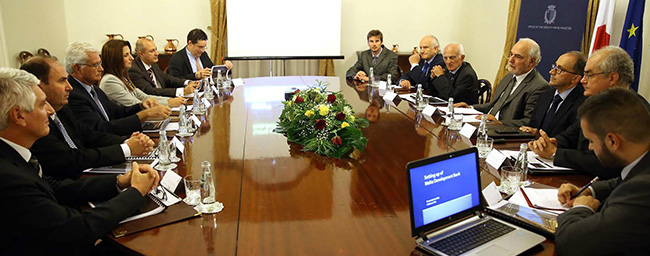The Deputy Prime Minister Louis Grech today met members of the Malta Bankers’ Association (MBA) to brief them about the Malta Development Bank (MDB) and discuss with them the role that the private banks will have in the new Bank’s operations.
The Malta Development Bank will serve as a second-tier financial institution when private commercial banks fail to make appropriate financing available, or when such is offered, normal market terms are not given.
In a presentation to the Banks by Rene Saliba, chairman of the Working Group appointed by the Deputy Prime Minister, it was revealed that the Group had identified a financing gap of between €2.3bn-€3.1bn, which, if one included a large infrastructural project like the monorail or a light railway, could easily reach between €1.4bn-€2.3bn.
Minister Grech referred, in particular, to the assistance that the MDB could give to small and medium-sized enterprises, whose financing gap was estimated at between €334m and €602m.
The Bank is expected to have an authorised capital of €200 million, allowing it to leverage this to around €1 billion of loans in due course. The initial paid-up capital is expected to be around €30m, with further capital pay-ups depending on the growth of the Bank’s business.
Mr Grech said that the setting up of such an institution will significantly extend Malta’s financial structure and contribute to economic growth.
Representatives from APS Bank, Bank of Valletta, HSBC Bank, Lombard mBank, Medbank/Medcorp and MBA that were present for the meeting welcomed the establishment of the Bank and agreed that it would be a very useful institution complementing and supplementing the lending activities of the private banks. They exchanged views with the Deputy Prime Minister, Mr Saliba and the Deputy Governor of the Central Bank, Mr Alfred Mifsud, about various aspects of the proposed Banks’ operations.
The Bank has already obtained the approval of the European Commission, after it was found to be in line with EU state aid rules.
The Bank will be owned 100 percent by the Government. It will have a guarantee from the Maltese Government on both the assets and liabilities side, the extent of which will be negotiated between the Bank and the Ministry of Finance.










